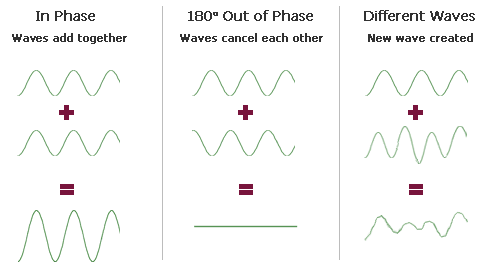Wave Interactions
Learnig Targets
Students will explain how waves interact when they meet and obstacle.
Students will explain what happens when two waves interfere.
Vocabulary
Reflection - the bouncing back of a wave when it meets a surface or boundry
Diffraction - a change in the direction of a wave when the wave finds an obstacle or an edge such as an opening
Refraction - the bending of a wavefront as the wavefront passes between two substances in which the speed of the wave differs
Interference - the combination of two or more electromagentic wavefors to form a resultant wave in which the displacement is either reinforced or canceled
Constructive Interference - any interfernce in which waves combine so that the resulting wave is bigger than the original wave
Destructive Interference - any interfernce in which waves combine so that the resulting wave is smaller than the largest of the original waves
Standing Wave - a vibration of a system in which some particular points remain fixed while others between them vibrate with the maximum amplitude
Constructive and Destrcutive Waves
Both of these waves occur when two waves interact with eachother.
Constructive waves are when they are the exact same and come together to make a same bigger wave. Deconstructive waves get rid of eachother and are formed by two waves that are same in size but opposite in direction/movement.
Reflection
An example of reflection would be when you look into a mirror. The image and light of yourself hits the mirror, thus your reflection bounces back to you.
Refraction
Refraction is when light can bend and move through a material. Placing a straw into a glass of water will make it appear as if the straw is bending. This is because of the change of substances (air to water).
Diffraction
Diffraction is when a wave is allowed to travel through different corners or basically having the energy bend and go through objects. An example of this would be when you yell at someone from a hall, and them being able to hear you from across the corner.
Standing Wave
A standing wave is a wave that sits thre vibrating up and down in place. An example of this would be a musical instrment, such as a guitar and its string.

When waves interact with one another they tranfer energy in a different way. When two waves are the same, they come together and form a bigger wave. Now, when two waves are the same in wavelength and frequency, but going opposite times, they cancel eachother out. And finally, when two waves have different frequencies and wavelengths, a new wave is created.
Video:
This video is a good reference to phyically see how waves respond when they interfere with eachother. They all react different and it depends on the waves similarity or differences.